Blondie
Little
Girl Lies.
Albums
Reviewed: Blondie, Plastic Letters, Parallel Lines, Eat
to the Beat, Autoamerican,
Heart on a Wall, The Hunter.
Blondie. Yep.
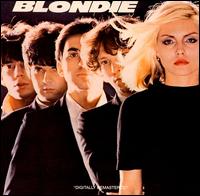 Blondie
(Feb.
1977), ***
Blondie
(Feb.
1977), ***
In many
ways, Blondie is a
bizarro world Talking Heads.
Blondie focused on humor, a pastiche of musical styles that
were
long since outdated, and above all, a strong sense of style.
They are a lopsided grin, a naughty wink, and usually associated with
frontwoman Debbie Harry. There is little of the seriousness
of penetrating monologue of a David Byrne here, or the hypnotic
lockstep
of the Talking Heads' rhythm section. Blondie has a pretty
good formula: deliberately cheesy synth parts, smart humorous lyrics
set
to discarded 50s and 60s sounds - Motown girl groups, surf music,
cloying 50s ballads, even a ode to West Side Story.
The quintessential example is the opening track, "X Offender"
which opens, like many early 60s songs, with a spoken intro from Harry
on how she wants to
go with an unspecified "you." Of course, it turns out that
"you" refers to the officer arresting her for
prostitution. That
is the sort of humor that is prevalent on this album. The
lyrics are almost all pure pop kitch, and deliberately so.
Listen to the way she says "flesh" on "In the Flesh,"
another psychotic love obsession song. It sounds perverse;
you
don't want flesh, and the word has
such a horrible
sound to
it. (Also note the double entendre contained in the chorus
of
"Look Good in Blue")
Drummer
Clement Burke
worked hard, enabling the group to shift genres
successfully, but the band's sounds pretty thin. The band has
"loose coordination,"
but it is clear that Harry was the one to which you are supposed to pay
attention. The rest are there to fill out a
police lineup, occasionally tossing off a central riff, or something,
but pretty nonchalant. Hell, I think they would have lost a
blindfold,
instrumental-only battle of the bands to the Cars. Maybe even
to Tom Verlaine alone. Do the general public remember anyone
besides Harry nowadays? Did they at the time?
Blondie has no dominant songwriter,
and
a fair amount of co-writes between the guys and Harry. Well,
at
least they were a good backing band - not flashy enough to detract
from Harry's vocals (and stage presence, I imagine), and certainly
not like the interlocking nature of the Talking Heads. Thus,
right from the start their sound is structured like a pop band, but
one with a different. Put it all together and it's New Wave;
commercial, highly marketable New Wave at that. But they were
more
like the Cars, in that their underlying issues aren't connected with
social issues or frustration. Instead, everyone has a good
time, although I hope that their future albums are better
times.
But
for
all their
sense of style (just look at the cover), Blondie has enough sense to
make fun of hipper-than-thou insiders on "Rip Her to Shreds."
It's a good method, but there's a real risk of it being a formula
here, and a couple of the songs are almost pure fluff (the B-movie
horror of "Attack of the Giant Ants" or the disco-fueled
"Man Overboard"). Still, it's hard to beat a good
riff, such as that on "Rifle Range" although the band
rarely gets loud ("Kung Fu Girls" is one exception).
It's a bit like the Zucker brother movies that were beginning to
appear in this era. The mock seriousness of Airplane!
is
similar in tone (although with less style), a series of fun
take-offs, which can quickly go downhill (see Airplane! 2).
Here, if having and making fun might is enough for you, you'll be
satisfied. Irony goes a long way, but not
everywhere.
Produced by Richard Gottehrer.
Plastic
Letters (Feb. 1978), **1/2
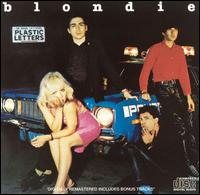
Oh,
Blondie, Blondie,
Blondie.
The
clever
pop continued on Plastic
Letters, and all was well in broadening their
repertoire of tongue-in-cheek pop tributes to odd topics clothed in 60s
pop. Plastic Letters' best songs are the giddy mock-pop ("Fan
Mail" is this
album's "X Offender", "I Didn't Have the Nerve to Say No"), and a
contemporary cover of "Denise" (renamed "Denis") was their first big
hit.
Beyond that, things are dicey. As
none of the musicians were instrumental leaders,
the band was
still built around Harry who could coo, espouse naivite, or
weariness depending on the circumstances. So while Plastic Letters is
tougher thanks to more
guitar and less keyboards, and they worked some new
(old)
sounds
with mixed success. Not all their 60s pop interpretations
have
much substance: "Denis" is bubbly product, and
a goofy attitude alone does not equal success ("I'm on E", "Love at the
Pier"). Their lyrics have interesting styles
like cinematic
fantasy (the dragging "Bermuda Triangle Blues (Flight 45)", "Contact in
Red Square")
and playful cynicism ("No Imagination"). Their
stabs at
R&B
("Kidnapped") or more danger ("Detroit 442, Cautious Lip") never click,
while Stein's fine
power-pop "Youth Nabbed as Sniper" turns Blondie into a mocking menace.
The songwriting is mixed at best, with Destri consistently
beating some of Stein's dogs like "Cautious Lip". The album
hits
dead spots a bit too frequently, even if they one of the few mainstream
bands who could make a song about contact with the dead a
delightful piece ("(I'm Always Touched By Your) Presence, Dear".
While Harry proved an eye-magnet, the music alone struggles
against turning into gimcrack.
Parallel
Lines (Sept. 1978), ****
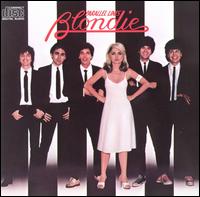
Schools
use quizzes and papers to ascertain that you are making progress in
understanding. Usually this comes to fruition with an exam or
paper,
where
you are expected to weave the threads into a coherent whole.
Congratulate Blondie, as Parallel
Lines is their senior thesis,
using well-appointed style, songwriting
hooks and Harry's variable vocals to bring their interests to a new
height.
Some credit goes to the continued emphasis on
guitars,
aided by new members guitarist Frank Infante and bassist Nigel Harrison.
While
none of the
guitar solos deserve to be etched into stone, Blondie riffs their way
into success ("One Way or Another", the rhythms and wordless singing in
"Heart of Glass"). When mixed with rebounding songwriting
from
the band and Jack Lee/Nerves covers, Blondie's New Wave pop
songs have enough propulsion and edges to make them great such as "You
Keep Me Hanging on the
Telephone," "Pretty Baby", "Picture This", with subtly obsessive lyrics
("One Way or Another"), or personal cinematic visions ("11:59").
The most well-known track is probably "Heart of
Glass", a
glossy disco song delivered in Harry's smooth and winking
voice.
The album isn't all confection or the culmination of previous
ideas; the fascinating "Fade Away and Radiate" is a
deep breath in the middle of the album, with an icy, building,
Pere Ubu-like intro and guitar from Robert Fripp,
while Harry
delivers one of her more dramatic performances. Some points
are
weaker, the retro 50s/60s approach (the classic "Sunday Girl" and "I'm
Gonna Love You Too"), intentionally self-mocking hip rock tracks ("I
Know But I Don't Know" and "Just Go Away"), but Parallel Lines is a
body of songs with all the right parts.
Eat to the Beat
(Oct. 1979), ****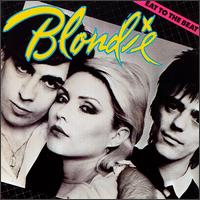
One
of Blondie's strengths was that their sound is disposible: they don't
take themselves too seriously and which also makes them more fun to
listen to than the Talking Heads. Eat
to
the Beat is a perfect example; a wonderful
successor to Parallel
Lines - no major changes, just more
disco elements, clean production and
plenty of Burke's furious drumming ("Dreaming", "Victor").
Blondie's trademarks are present - humerous lyrics (the
snarky reggae of "Die Young Stay Pretty" and the mock lullabye of
"Sound-A-Sleep"), girl groups ("Slow Motion") and Destri's excellent
power-pop ("Accidents Never Happen", "Living in the Real World").
The best songs follow "Heart of Glass": disco beats
with pop
("Atomic" with spy guitar lines and
Destri's pulsing
synths, "The Hardest Part" about robbing armoured cars).
A few songs are underwritten, but still have good parts:
"Union City Blue" has a nice feel but no momentum and "Shayla" has a
nice chorus. The writing is spread throughout the band, with
Harry and Stein writing about half the album (including the one joke
"Sound-A-Sleep") and Destri has a golden touch. Talking Heads
may have been more complex, but simple pop is good
enough.
Autoamerican
(Nov.
1980), **1/2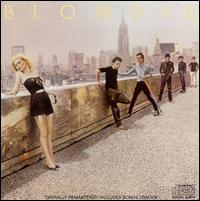
Blondie's
fifth album finally crossed the line between rock band and pop group
with a few winks. Recorded in LA, Chapman's production is the
aural equivalent of soft focus - glossy, and with plenty of session
players to put things on an even keel. Blondie the band is
in short supply on Autoamerican,
even if their lyrics have bite. Certainly
eclecticism is still paramount - Autoamerican's
two big hits were vastly different - a reggae cover of "The
Tide is High", which is a bit too similar to Eat to the Beat's
"Die Young Stay Pretty", and the rock/rap hybrid "Rapture".
(Absolutely groundbreaking, and absolutely dated). The album opens
with Stein's "Europa" and "Live It Up" - practically an overture with
orchestral backing and a minimal guitar line phasing into a spoken word
piece. "Angels on the
Balcony" and "Do the Dark", two of Destri's power-pop songs, are some
of the stronger tracks, but lack edge. (A
third, "Walk Like Me" does
not come close). On the whole, the
band's rock tracks belong more to the teased hair world than the New
York scene, and often sound like Michael Jackson backing tracks.
Harry's voice was Blondie's signature feature, but was often
the only distinguishing feature. She gets to sound kittenish
on some faux 40s cocktail numbers ("Here's Looking at You" and
"Faces"), which have questionable input from the band. Far
worse is the album's ending: a cover of Camelot's "Follow Me" is
just Harry's etherial voice over a session man's synthesizers.
None of the band's playing stand out; instead session men
ranging from Flo & Eddie to Tom Scott appear at various points.
Blondie's big-time pop album may have had mass appeal, but
somewhere their rough edges were hewn; insincerity and
sincerity became indistinguishable.
Jimmy
Destri: Heart on a Wall (1981),
**1/2
 1981
was the year of the Blondie solo projects, and Destri tried
to launch a solo career with this album. (Although
it is the
Alpha and Omega of his career, a sticker - "The
first solo album from Jimmy Destri of BLONDIE" indicates that it wasn't
supposed to be that way). Destri wrote pop songs which
usually
were integral to Blondie albums, and his album avoids the bloat of
Autoamerican for their earlier sounds. Plus, he snagged an
excellent group of musicians to back him: bandmate Clement
Burke, Bowie sidemen Carlos Alomar and Earl Slick,
producer/keyboardist Michael Kamen, rounded out with session men John
Siegler on bass and guitarist Tommy Morrongiello. Destri, the
acolyte turned leader, is not well suited to the role, being a
talented songwriter who has a
raspy, strained singing voice. The music is
consistent with
his Blondie material - full band pop songs with good
choruses and beats ("Don't Look Around"), and not overblown (one
exception is "My Little World" which is fashioned into a repetitve
"big" number). One track ("Liffe Metal Drummer") may even be
a
Blondie outtake, as Stein appears on guitar and female vocals
sing
in the background over a cross of a 60s spy theme and a Sergio Leone
soundtrack. Destri's delivery is more sincere than
Harry's
nuanced singing, but the songs almost require a strong singer.
Instead, Jimmy
Destri
has to make do with singing whispers or raspy shouts over otherwise
good songs ("Bad Dreams", "Don't Look Around" and "Numbers Don't
Count"), and relies a touch too much on the same feel. Most
of
these songs could have made a good Blondie album, but Destri's
voice
makes it a beautiful elevator with a badly frayed cord.
1981
was the year of the Blondie solo projects, and Destri tried
to launch a solo career with this album. (Although
it is the
Alpha and Omega of his career, a sticker - "The
first solo album from Jimmy Destri of BLONDIE" indicates that it wasn't
supposed to be that way). Destri wrote pop songs which
usually
were integral to Blondie albums, and his album avoids the bloat of
Autoamerican for their earlier sounds. Plus, he snagged an
excellent group of musicians to back him: bandmate Clement
Burke, Bowie sidemen Carlos Alomar and Earl Slick,
producer/keyboardist Michael Kamen, rounded out with session men John
Siegler on bass and guitarist Tommy Morrongiello. Destri, the
acolyte turned leader, is not well suited to the role, being a
talented songwriter who has a
raspy, strained singing voice. The music is
consistent with
his Blondie material - full band pop songs with good
choruses and beats ("Don't Look Around"), and not overblown (one
exception is "My Little World" which is fashioned into a repetitve
"big" number). One track ("Liffe Metal Drummer") may even be
a
Blondie outtake, as Stein appears on guitar and female vocals
sing
in the background over a cross of a 60s spy theme and a Sergio Leone
soundtrack. Destri's delivery is more sincere than
Harry's
nuanced singing, but the songs almost require a strong singer.
Instead, Jimmy
Destri
has to make do with singing whispers or raspy shouts over otherwise
good songs ("Bad Dreams", "Don't Look Around" and "Numbers Don't
Count"), and relies a touch too much on the same feel. Most
of
these songs could have made a good Blondie album, but Destri's
voice
makes it a beautiful elevator with a badly frayed cord.
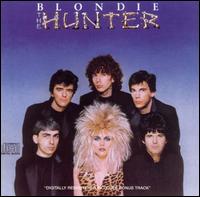 The Hunter (May
1982), **
The Hunter (May
1982), **
Only after being hungover from a wedding did I
understand The Hunter. With their final (classic era) album, Blondie soldiered their pop
approach into further musical styles, with a mind to convert
anything and everything into long, dance-beat songs. Thus, after
Autoamerican's
Blondie-does-ska, we have Blondie-does-calypso with "Island
of Lost Souls" or the odd rap-meets-disco "The Beast". The
nadir comes with "Little Caesar", for which Harry quasi-raps as a
sort-of child Jimmy Cagney. These sit alongside middling tempo
dance songs ("Orchid Club", "War Child"). The entire album is enslaved to its bloated production and prolonged beats,
leaving little room for musicans. The entire first side is nearly given over to this stuff - music to not disturb a workplace, or
for wedding receptions when people are already in a frenzy of movement
and need to keep it going at all (artistic) costs. Blondie's old interests are given this treatment.
"Dragonfly", about
drag racing in space, recalls their early B-movie stories; but really is only a story, as the song
is a poor excuse for another mindless beat and endless narration.
The better
songs avoid this zombie movement - Destri's "Danceway" is a final 60s
pop song, and a cool, cabaret cover of "The Hunter Gets Captured by the
Game". Regretfully, Harry's empty lyrics mar the
other two tolerable tracks - a rejected James Bond theme ("For Your Eyes
Only") and "Find the Right Words". The album isn't really so much an
embarrasment - it is too well produced for that - as it is a waste of
time. (This grade could easily be cast downward a bit).
Yes, they reunited. Also, yes, I am going to ignore those albums.
 Blondie
(Feb.
1977), ***
Blondie
(Feb.
1977), ***





 The Hunter
The Hunter